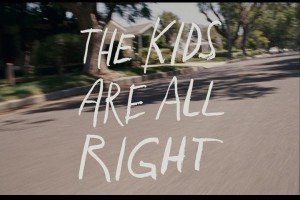
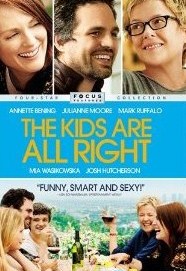 BUY FROM AMAZON: CLICK HERE!
BUY FROM AMAZON: CLICK HERE!
STUDIO: Focus Features
MSRP: $29.98
RATED: R
RUNNING TIME: 106 minutes
SPECIAL FEATURES:
The Pitch
Lesbian progeny are desperately curious about their real father.
The Humans
Julianne Moore, Annette Bening, Mia Wasikowska, Josh Hutcherson and Mark Ruffalo
The Nutshell
Two lesbian moms are hitting a weird point in their relationship. Their older women that seem to be enjoying the daily activities, but their kids are waiting in the wings with a big surprise. The elder child Joni has discovered her sperm donor father and she wants to make contact. The younger child Laser calls his friends by gay epithets while doing what a teenage boy does in this modern era. Things are about to get shook up when Mark Ruffalo returns to shake up the family dynamic.
The Lowdown
The Academy Award nominations were announced Tuesday morning. I was really hoping to finish my look at the lives of two middle-aged lesbians, before we had that shroud of Award hype lingering over it. But, I love to play Farmville and delays happened. What we now have is a film that did well on the arthouse scene and is now going to find new legs with the Redbox crowd. While I don’t expect everyone to enjoy what Focus is selling here, there’s quite a film to be seen.
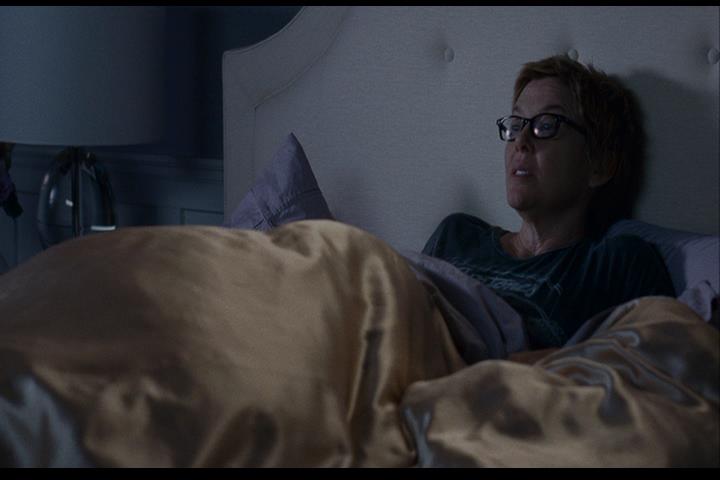
The Kids Are All Right will spend the next month being the target of film nerd ire. I’m not excluding myself from that group, as I still have huge issues with Mark Ruffalo getting nominated. Shake that shit off and work past what you’ve learned in the trailers. Forget Ruffalo’s goofy fucking face, as he only serves one point in this film. Ruffalo is the interloper into a tale of a loveless marriage. Nic and Jules are the lesbian moms mentioned earlier, but that doesn’t define them. What defines them is what has come to define all older couples, as they creep deeper into middle age.
They are a sexless couple that still loves each other, but they don’t know how to communicate. The ladies watch gay porn while in bed, but it’s more of an amusement than stimulation. When Joni and Laser bring Mark Ruffalo back into their lives, they start to break out of their routine. Here’s where the film loses me. I know that Hollywood isn’t ready to make a serious drama about marital issues facing GLBT couples in America. However, why does everything regarding gays need to turn into a melodrama or a comedy?
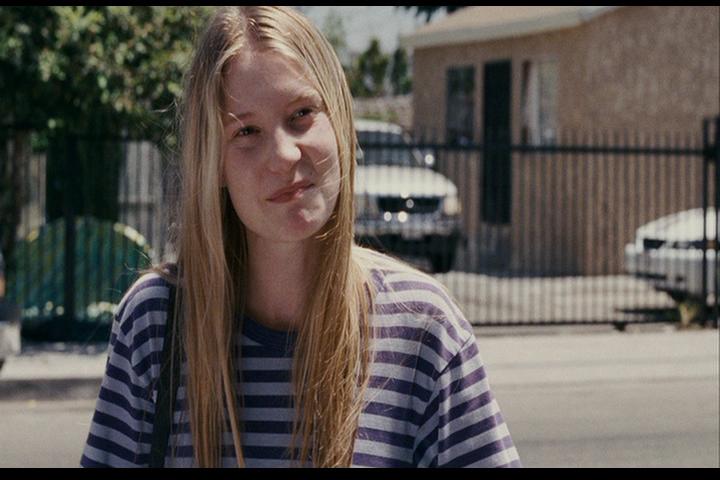
Director/Co-Writer Lisa Cholodenko is one of those talents that I couldn’t quite peg after viewing High Art and Laurel Canyon. When I watch how she masterfully plays Nic off of Jules, I know that I’m seeing a director that understands relationships. These are relationships that go past gay, female or parental identities. Where Cholodenko messes up is when she seemingly makes a compromise with Co-Writer Stuart Blumberg on the tone of the final sequence. I’m going to tread lightly here without spoiling sensitive material, but there’s something truly wrong with how Mark Ruffalo’s character was dispatched from Nic and Jules’ lives. Not wrong as in the incorrect artistic choice. Wrong as in awful character decisions based on flawed rationality that leads to a disgusting moment of selfishness.
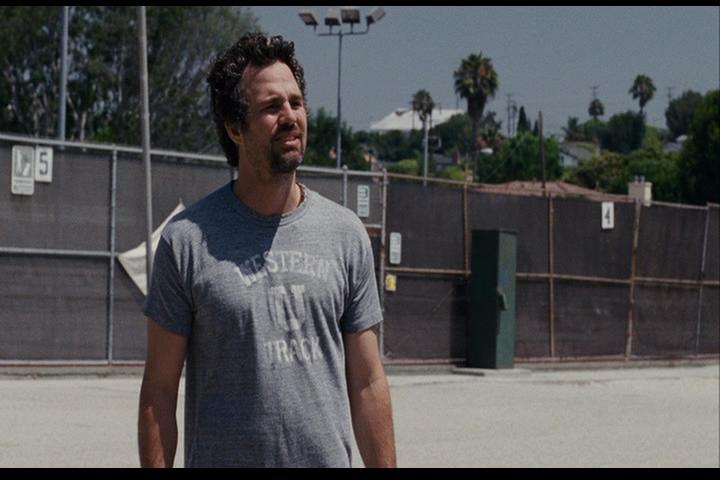
There is a lot of weight to that last sense, which often gets misread by viewers. It also falls apart due to Ruffalo’s reaction and it’s part of the reason why I take issue with his Oscar nomination. I feel that a more well-rounded actor could’ve made more out of the finale, but Ruffalo just seems to take it in stride. The problem with that choice on Ruffalo’s part is that it calls into question Cholodenko’s development of Nic and Jules. While Jules is played as the flexible bisexual, Nic is forced to come down as the hardass lesbian. Annette Bening works her ass off in this film and I’m glad that she was recognized today. However, the laziness of that third act construction coupled with the casual flow screws up the film’s intent.
Bening does the heavy lifting in the film, as she sets up the problems with the relationship. She knows that her kids are curious about their sperm donor father. Nic can see that Jules is slipping away, but she won’t budge out of routine due to fear. It’s only be re-establishing her role in the family unit that Nic finds the strength to sharpen her family’s direction. Joni is going to go off to college, Jules is going to get some heavy lovin’ and all outsiders land on their ass somewhere else. Some viewers might read that as the establishment of the modern matriarch, but the film awkwardly offers up another reading.
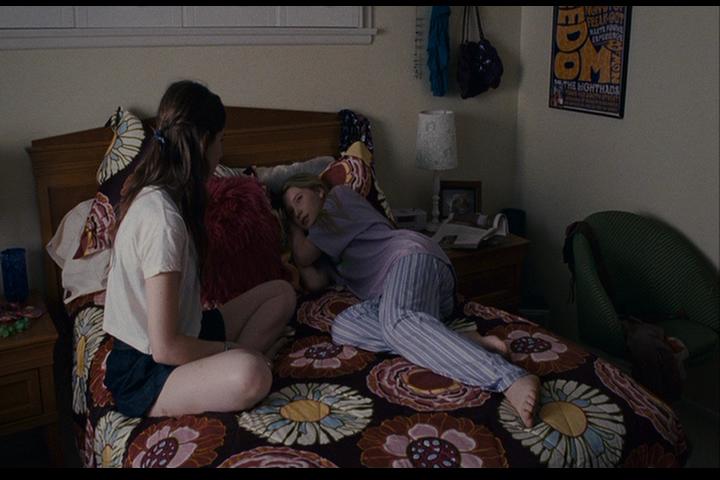
What the film tells us is that Nic has found her role by forcing established roles back into her unconventional life. She can’t handle change and the only way she can take control of her life is by bringing everyone down with her. It’s not a mean gesture, but one that reeks of passive-aggressive intent. When you see how Laser responds to having Ruffalo in his life, you almost get a whiff of a brighter future. Jules finally gets a chance to question her sexuality and wonder about a life outside of Nic. The only person who has a shot of escaping is Joni, but that’s only to a college environment where Nic will ultimately end up pulling the purse strings.
I never thought that Bening was supposed to be the villain of the piece, but I can’t actually call her actions heroic. She’s a troubled woman that wants to have normalcy back at all costs. Bening plays Nic like a Stanley Kramer character’s nightmare. Instead of wondering who came to dinner, she invites Ruffalo into her home and breaks him. She holds this male outsider up before her family and makes him the symbol of everything that threatens to tear them apart. Casting out this force and bringing back order allows for a cynically conservative take on liberal issues.
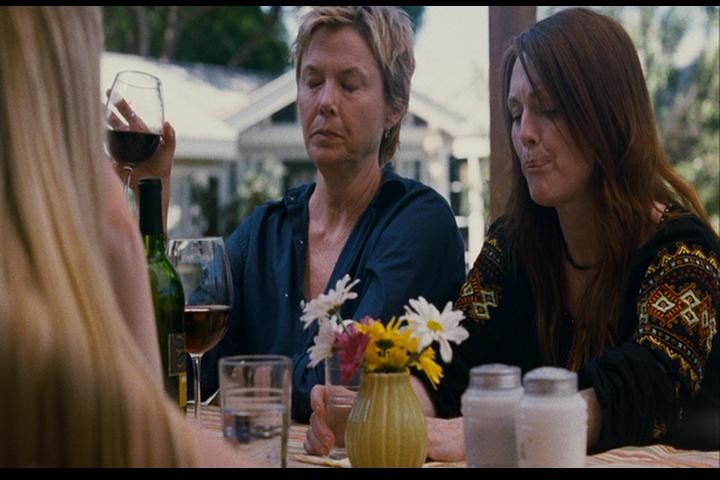
The Package
The DVD contains a ton of featurettes about the production. Lisa Cholodenko provides a commentary that was recorded in the Fall of 2010. It’s pretty nice, as we get to hear the director discuss her work without the luster of Awards Season fogging the details. While she goes in depth about constructing the screenplay, she’s a little too wrapped up in emotional response. While that beats dead air on a commentary track, I feel that half of the commentary was spent offering up soft clips. Save that crap for the EPK material, I listen to commentary tracks to learn. The A/V Quality is strong enough for standard definition, but I picked up a lot of edge enhancement towards the end of the film. They’re were jaggies or similar artifacting, but the issues were there.





Out of a Possible 5 Stars